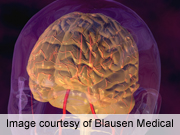November 5, 2014

 By Randy DotingaHealthDay Reporter
By Randy DotingaHealthDay Reporter
Latest Neurology News
MONDAY, Nov. 3, 2014 (HealthDay News) — One possible reason for memory decline in older age may be that brain networks become less able to maintain their separate functions, a new study suggests.
The findings suggest the brain has a harder time with memory when its separate parts work closer together. “Too little segregation seems to be a bad thing,” said study co-author Gagan Wig, of the School of Behavioral and Brain Sciences at University of Texas at Dallas.
At issue is how the parts of the brain work together — or work separately. Do the sections each have specialized roles, like players on a baseball or football team? Or are they like the security guards at the stadium that have pretty much the same job? And what’s the best mix of specialization versus unification?
Scientists have debated this topic for years, said Michael Cole, an assistant professor with the Center for Molecular and Behavioral Neuroscience at Rutgers University in New Jersey.
“The field has repeatedly swung back and forth over the decades between focusing on specialization and distribution, with both sides finding evidence for each,” said Cole, who wasn’t involved in the study.
Now, they’re acknowledging that “the answer lies somewhere between the two extremes,” he said. “This study goes one step further by looking at how there may be an ideal balance to support effective brain functions among age groups.”
The researchers said advanced years are associated with less specialized brain cells, but they noted it hasn’t been clear if the same decline occurs at the level of brain networks.
In the study, published online Nov. 3 in the Proceedings of the National Academy of Sciences, researchers used functional MRI scans to study the brains of 210 people aged 20 to 89. “This was to measure blood flow in the brain while people were awake and at rest,” study co-author Wig explained.
“This type of scan allowed us to determine how different parts of the brain were functionally connected with one another, and examine each individual’s brain network organization,” Wig explained.
The connections in this network are a bit like those of people “who interact in a social network and tend to be highly connected to a few subgroups of closer friends, and less connected to other individuals,” Wig said.
Participants also took memory and thinking tests to gauge how they formed memories and remembered things over minutes and hours, Wig said.
The researchers found that older adults had more connections between different brain sections, which translated to worse memory skills. In other words, a more-connected brain seems to be worse for memory.
But older age isn’t a guarantee of a more-connected brain and worse memory. “The surprising thing we found is that this relationship is independent of age,” Wig said. “There were some younger adults that had lower system segregation, and they had poor memory ability. Likewise, there were older adults who had higher system segregation and good memory ability.”
What’s next for research in this area?
“The natural next step will be to understand how the segregation of brain sub-networks in each individual changes as they grow older, by scanning them repeatedly over time,” Wig said. Researchers are especially interested in finding out what happens in people with memory disorders related to age, he said.
What does the study mean for prevention, diagnosis and treatment of memory problems? Wig said one of the goals of his research is to find indicators in the brain that could predict pending memory problems.
 Copyright © 2014 HealthDay. All rights reserved.
Copyright © 2014 HealthDay. All rights reserved.
SOURCES: Gagan Wig, Ph.D., assistant professor, School of Behavioral and Brain Sciences, University of Texas at Dallas; Michael Cole, Ph.D., assistant professor, Center for Molecular and Behavioral Neuroscience, Rutgers University, Newark, N.J.; Nov. 3, 2014, Proceedings of the National Academy of Sciences
![]()